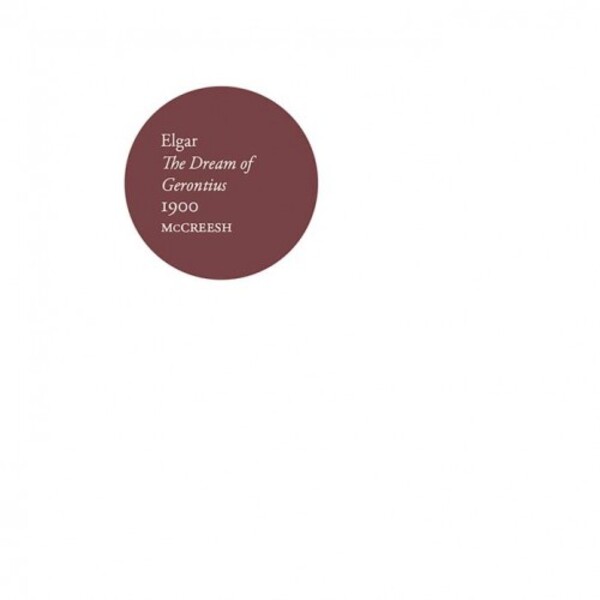ELGAR The Dream of Gerontius (McCreesh)
View record and artist detailsRecord and Artist Details
Genre:
Vocal
Label: Signum Classics
Magazine Review Date: 05/2024
Media Format: CD or Download
Media Runtime: 95
Mastering:
DDD
Catalogue Number: SIGCD785

Tracks:
| Composition | Artist Credit |
|---|---|
| (The) Dream of Gerontius |
Edward Elgar, Composer
Andrew Foster-Williams, Bass-baritone Anna Stéphany, Mezzo soprano Gabrieli Consort Gabrieli Players Gabrieli Roar Nicky Spence, Tenor Paul McCreesh, Conductor Polish National Youth Choir |
Author: Jeremy Dibble
A culmination of his choral essays in symphony (The Black Knight), oratorio (The Light of Life) and dramatic cantata (King Olaf and Caractacus), The Dream of Gerontius belies such schematic categorisation. Elgar disliked the term ‘oratorio’ and did not include it in his manuscript score. But the towering presence of the chorus, functioning both as turba (crowd) and as a reflective commentator, retains the work’s personality as an oratorio. It was a model Elgar would repeat in his two other Birmingham oratorios, The Apostles (1903) and The Kingdom (1906), yet while the two latter works have sections that are compatible with staged opera, Gerontius, for all its Wagnerisms, is much more a voyage of the spiritual imagination, hence its metaphysical other-worldliness has always made it a work highly congenial to enjoy as a recording.
McCreesh brings an impressive control of contrasting tempos to the polyphonic, multicolour orchestration that forms such an intrinsic part of the work. Moreover, as the detailed booklet notes illuminate, an attempt is made to recreate the orchestral sound through use of period instruments with which Elgar would have been familiar in 1900, and which, as McCreesh argues at some length, allow for the exceptionally wide range of dynamics (especially in the strings) that Elgar demands. In the Prelude, the thematic seedbed of so much that pervades the rest of the work, we are immediately subjected to the timbres of these instruments. I was struck, for example, by the tone of the opening judgement theme and the mellow cello sound of the ‘delirium’ motif, not hurried (as it sometimes can be), which leads naturally into the entreaties to Mary and the first major climaxes. Similarly, the fulsome slow march (‘Go forth in the name’) is robust and majestic without being forced.
Nicky Spence, who sings the role of Gerontius, delivers Elgar’s flexible operatic declamation with real authority and, at least for me, rivals Richard Lewis’s ageless interpretation under Barbirolli. Gerontius’s combination of agitation, fear and hope is palpable in the Parsifal-like ‘Sanctus fortis’ monologue and, after the premonitions of the demons, Spence reaches a commanding peak with his high, agonised B flat (‘in thine own agony’), the emotional ‘Novissima hora est’ and his final tortured cries (‘Take me away’) after he has laid eyes on his creator. The sense of timelessness at the beginning of the second part is beautifully depicted by the orchestra and Spence’s persuasive sense of lyrical reawakening (‘I went to sleep’), and there seems to be an inevitability about the entry of the Guardian Angel, tenderly imparted by the dulcet yet appropriately plangent mezzo-soprano voice of Anna Stéphany (a hard act to follow after Janet Baker but executed here with a poignant, empathetic tenderness). Her ‘love’ duet with Spence is intensely passionate yet winningly chaste, as are her heart-rending ‘alleluias’. Andrew Foster-Williams also cuts a powerful figure as the Priest in another stately march (‘Proficiscere, anima Christiana’) whose tempo is perfectly judged, and his impassioned, more mordant aria as the Angel of the Agony, replete with some of the most anguished chromaticism in the work, provides a powerful foil and preparation for the dramatic culmination of Gerontius’s glimpse of the Almighty.
This review would not be complete, however, without acknowledging the admirable contribution of the chorus, made up of singers from the Gabrieli Consort, Gabrieli Roar and the Polish National Youth Choir. Throughout, the intonation, clarity of words, gradation of dynamics and rhythmical incisiveness are compelling. Yet even more captivating, and perhaps the principal reason why I was moved to return to this recording numerous times, is McCreesh’s differentiated response to the range of choral styles Elgar asks for in his score, and which allows the chorus to function, when required, as a truly involved ‘collective’ character.
Besides the value of hearing the ‘period’ qualities of the orchestra on this recording, the sensitively engineered sound also allows one to hear a good deal of orchestral timbres (including the significant organ part) which are often lost in other recordings. This is especially true of many of Elgar’s inner contrapuntal lines (a real bonus given Elgar’s prowess for countermelody and three-part counterpoint), as well as the chance to savour the composer’s dexterous variety of woodwind doublings, low brass and multiple divisi strings. Such facets make this recording one to have if you are a fan of English choral music; and even if you are a dyed-in-the-wool Elgarian with special loyalties to a particular interpretation, be it by Barbirolli, Boult, Britten, Davis, Hickox or Elder, this CD is brimful of edifying delights and surprises worthy of repeated listening. Most of all, its expressive choral and orchestral merits, to quote the words of Newman’s angel, are such that it ‘will gladden thee, but it will pierce thee too’.
Explore the world’s largest classical music catalogue on Apple Music Classical.
Included with an Apple Music subscription. Download now.

Gramophone Digital Club
- Digital Edition
- Digital Archive
- Reviews Database
- Events & Offers
From £8.75 / month
Subscribe
Gramophone Full Club
- Print Edition
- Digital Edition
- Digital Archive
- Reviews Database
- Events & Offers
From £11.00 / month
Subscribe
If you are a library, university or other organisation that would be interested in an institutional subscription to Gramophone please click here for further information.




